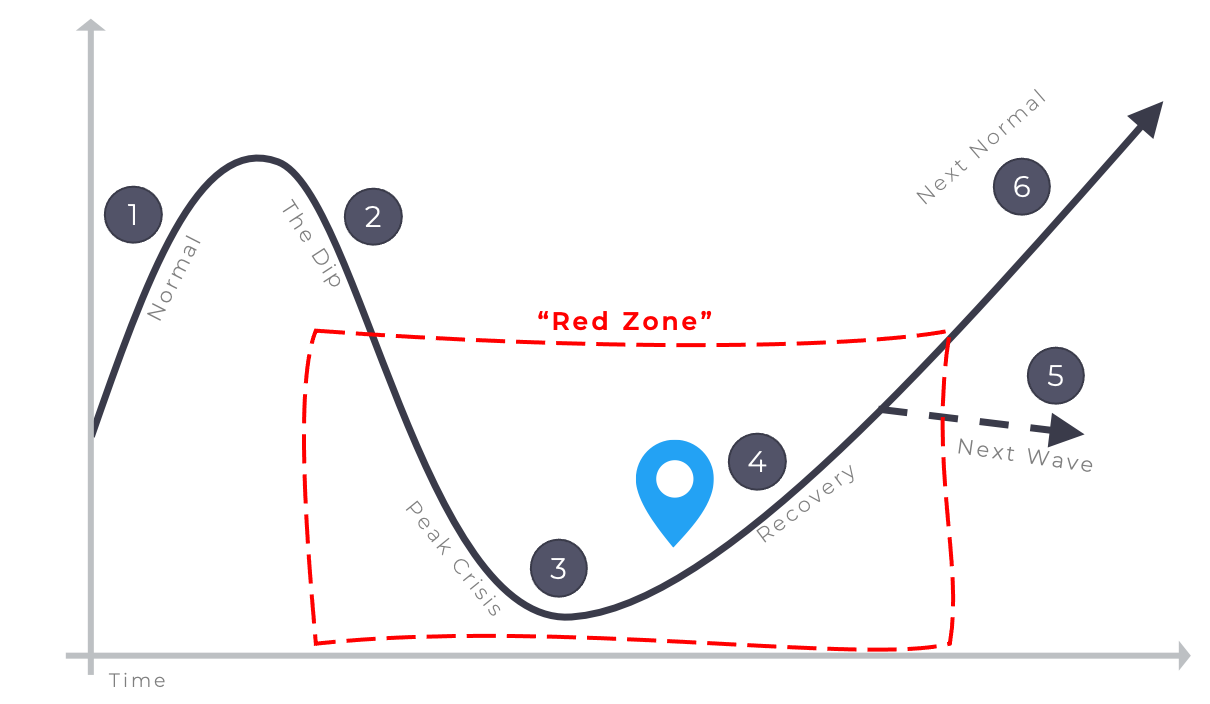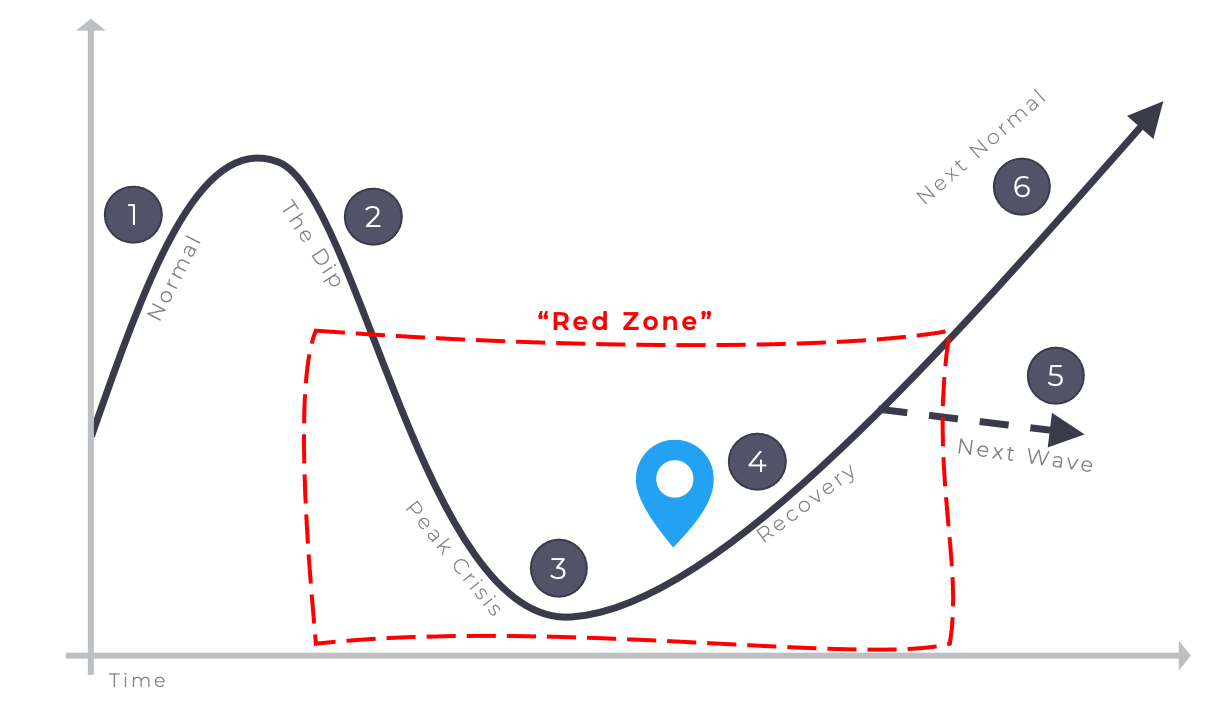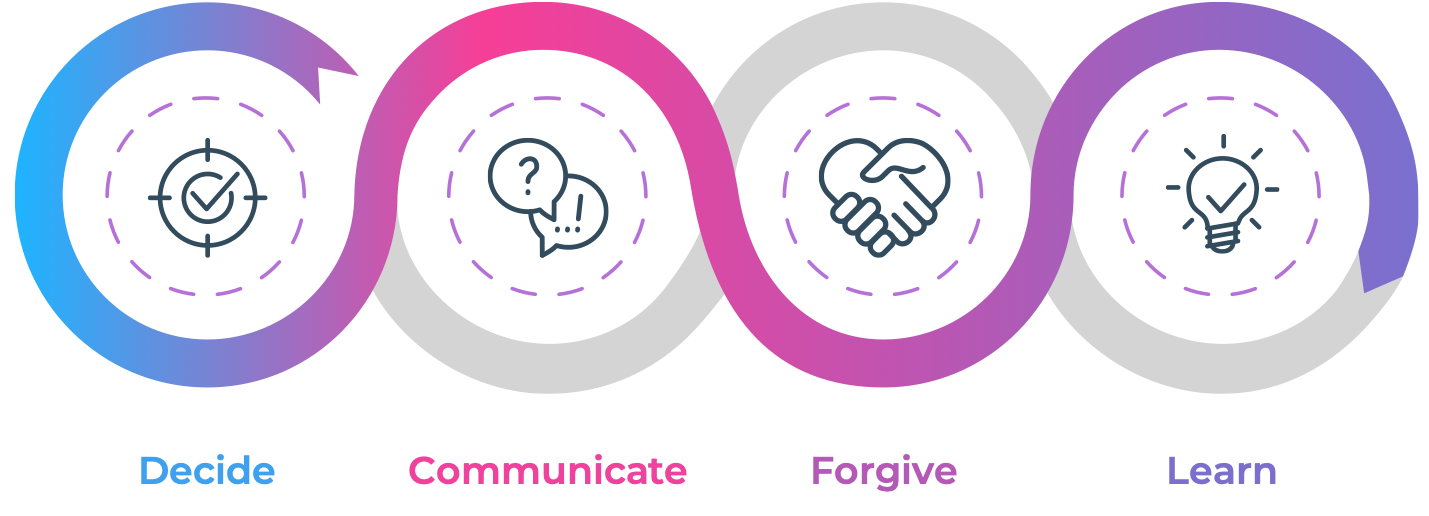Leading Through Crisis

Earlier on in my career I was working alongside a team of really smart developers building an application that you have probably used at a company you have probably head of as one of the typical unicorns. Quarter after quarter we worked together, delivering well, making progress. Times were good, until they weren't.
One day, the manager on the team was asked to manually change values on a report to make the overall business outlook more rosy.
And, just like that, crisis.
The day before, everything was normal. Now, we're in the dip. That first feeling you get in your stomach when something is wrong and you can sense that your next few actions are very important. Worse, in this case, they have a bearing on your near-term employment and ability to continue to earn an income.
Crises come in all shapes and sizes. We're in a massive global crisis right now due to COVID-19 and there are moments in every crisis that have outsized impacts on an individual's or organization's ability to effectively navigate and recover.
The problem with these once-in-100-year crises is they tend to happen about every decade. Whether it's financial (like 2008), political, health related, environmental, etc. There are lots of categories ready to surprise us with black swan events. And, these are just the macro events - individual and organizational crises happen much more frequently.
In the case of the unicorn, the Manager made the right decision, tactfully said no in a way that let cooler heads prevail, and escalated appropriately where leadership supported his decision. Crisis averted through intentional actions and expert execution.
The modern leader needs a protocol at the ready to move forward when a crisis happens instead of spending time trying to orient in a chaotic environment while precious days/weeks pass with no action.
Managing the Red Zone
My favorite term for critical-moments-in-time is Red Zone. In American Football, the Red Zone (any time the ball is within the opposing team's 20-yard line) is where most of the points are scored for the game, and success or failure frequently points back to a few key plays in the Red Zone.
If we think about the typical curve of a crisis, we tend to sit in this Red Zone period for a while after the initial shock of the event has worn off and the war of attrition wages on. The idea here is to score a 100 on activities that you can control to maximize the chances of future stability.
Generally, the actions we take in the Red Zone can make or break our ability to effectively recover on the other end of the crisis. We create the widest ripple effects here for good or bad. And, if history has shown us anything, humans can always make bad situations worse. But, we have the good within us to beat the odds and make it through the direst of circumstances, better than we were before.

This is your opportunity zone as a leader to dig in and do everything in your power to recover. But, as we've seen during the global pandemic, some macro events are too large for us to have an individual impact on. Success is not guaranteed here.
Regardless, we must try. Below, is a framework that helped me greatly over the last year of uncertainty and chaos. It's something I didn't enter the crisis with, but wish I had it earlier, so I'm sharing it in the event it's useful to you.
The Minimally Viable Crisis Leadership Model
So, if you are asking yourself "what can I do, as an individual, during a crisis?" You've come to the right place!
Below, I've outlined the Minimally Viable Crisis Leadership Model as a practical toolset that anyone can leverage during a crisis to help inform next actions with a level of intentionality and focus.
Again, success here isn't guaranteed - it never is. But, hopefully this will serve as a bit of leverage to make your life easier as it has mine. I think about this framework analogous to a batting coach in baseball. You are ultimately the one that has to step up to the plate to swing, but sometimes it helps to have someone watching your tendencies and offering thoughts and ideas on how to improve slightly - to get an edge to help you succeed long-term.

Let's break each component down individually:
- Decide - In a crisis, time kills. You must make decisions faster than you feel comfortable - and most of the time without all of the context you with you had. First, decide you want to be part of the solution. During some crises, you will not be in a position to help. That's OK, not everyone needs to run into the burning building (just don't get in the way if you aren't in a position to help). After that, have a perspective about what you think the future holds and what the best path forward is - then go and make adjustments over time. Effective and rapid decisionmaking will have an outsized impact on the ripple effects you are creating into the future.
- Communicate - In good times, we rarely communicate as effectively or regularly or with the right people as we should. Just like the rule-of-thumb with decision making speed - you should be communicating around 5-10x more than feels natural. Use asynchronous communication to your advantage here. Create audio/video artifacts that can be shared, edited, and consumed at leisure. Everyone around you is not always ready to listen when you are ready to speak - especially in a crisis. And, most importantly, don't forget communication with your closest family and friends - your life is going to be different for a little while, make sure everyone knows what's going on in your head and how you are planning on operating so they know what to expect from you.
- Forgive - Chances of making mistakes in a crisis are magnified. Mistakes happen more frequently, they hurt more, and more people notice them. Others around you are going to screw up too. In high pressure situations, our brains can shut off a bit and we do silly things in the moment that we would never see ourselves doing. Take a minute, acknowledge this, and move on. I have only met 2 people in my entire career that were actually trying to intentionally sink the organization they were a part of. People just aren't nefarious at work, thinking they are by default is a limiting belief. Typically we view misaligned incentive structures or ignorance as malice.
- Learn - If Decide is the fundamental foundation of the framework. Learn is the other bookend. This is the Hero's Journey. If you are going to go through the trouble of navigating a crisis, you must do everything in your power to be better off at the end than the beginning. Your ability to learn from your mistakes, from the crisis itself, and others around you will set you up well to handle the next crisis that comes your way - because there is always another one coming. Some of this learning happens in the moment through experience, and some happens after-the-fact through introspection and reflection. Make sure to set aside time for the latter.
You can think of this model as a nested loop. You don't have to go in order, and you will repeat steps, bounce from one to the other, loop within an area for a while. All of this is OK and expected. The point is to orient yourself within your environment and take the action steps necessary - based on your best judgement in the moment - to move forward.
Practical Tips for Leaders Navigating a Crisis
If you find yourself in a crisis, you might feel like you were spun around and thrown into deep, cold, turbulent water with no visibility to the shoreline. If you are like me, at the beginning you might not be in the right frame-of-mind to take a framework like the one above, make sense of it, and chart a path forward. If that sounds like you, here are some practical steps you can take that can move the needle in a positive direction.
- Decide - Keep a Decision Journal. Write down decisions you've made, when you made them, how you were feeling, and some context. Revisit this later to create a feedback loop and improve your future-self's ability to make strong decisions.
- Communicate - Use Video and Audio. Go long-form and spend some time thinking out loud about the current situation, giving updates/key information. Source questions from your team using polling software or another low-tech solution and address them in-depth, publicly. We even created a local private podcast with regular interviews of leaders in our organization help here as well. Asynchronous and long-form content is your friend.
- Forgive - Take some downtime, recharge, put your oxygen mask on first. You will feel like you can't make it work, but you can. If you are more balanced in your personal life, you will have the mental energy to give people the benefit of the doubt, even if they don't deserve it. If you want to get really fancy, you can create a Trip Report around your time off and share it with your team to encourage them to do the same.
- Learn - Create an ongoing journal of things you have learned. This is for your eyes only. I prefer the Day One app for iOS and Mac. This is a way for you to capture, in real time, thoughts and ideas that you can synthesize and make sense of later. Right now, just focus on capturing, schedule time to dig in when you have breathing room. What you are reading now is based off of the random and sporadic notes I took over the last year+. March 12, 2020 was the Thursday we pulled the lever to have everyone work remotely indefinitely. We were at a restaurant and were supposed to be celebrating a colleague's retirement - instead we were worried about the future. Reviewing that note, going back to that moment, helps give me perspective on what to do next as a leader.
Finally, I'll leave you with a quote, some encouragement, and more content. Leading through a crisis is hard, I hope this helps you on your journey.
You must maintain unwavering faith that you can and will prevail in the end, regardless of the difficulties, and at the same time, have the discipline to confront the most brutal facts of your current reality, whatever they might be. -James Stockdale
Thanks for making it this far, if you want more on the subject, here is a podcast episode where we go a little more in-depth. Congratulations for opting in and wanting to be part of the solution. The world needs more people like you - go make it a better place.
Subscribe for Free
Want to stay ahead of the curve? Subscribe now to receive the latest updates, actionable insights, and thought-provoking ideas around business, technology, and leadership straight to your inbox.



